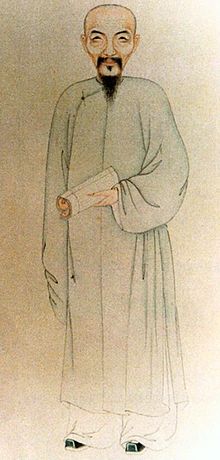Ji Xiaolan
| Ji Xiaolan | |
|---|---|
 |
|
|
In office 5 July 1796 – 13 November 1796 |
|
| Preceded by | |
| Succeeded by | |
| Personal details | |
| Born | 26 July 1724 Zhili |
| Died | 14 March 1805 (aged 80) Beijing |
| Spouse(s) | Lady Ma (died 1795) |
| Children | Ji Ruji (born 1743) Ji Ruxi (born 1766) Ji Ruyi (born 1784) |
| Parents | Ji Rongsu (father) |
| Posthumous name | Wenda 文達 |
Ji Yun (Chinese: 紀昀; pinyin: Jǐ Yún; 1724–1805), also known as Ji Xiaolan (simplified Chinese: 纪晓岚; traditional Chinese: 紀曉嵐; pinyin: Jǐ Xiǎolán) or Ji Chunfan (紀春帆) was an influential scholar of Qing dynasty China and many anecdotes have been recorded about him. Ji Yun left behind a book entitled Notes of the Thatched Abode of Close Observations, and another book named Wenda Gong Yiji (Collected Works of Lord Wenda, i.e. Ji Xiaolan), which was edited by later generations.
Ji Yun was born in Xian County of Hebei Province. When he was young, he was deemed intelligent. His father Ji Rongsu was a civil minister and archaeologist.
In 1747, Ji Yun rose to intellectual prominence after winning the highest distinction in the provincial examinations. Several years later, in 1754, he attained the jinshi degree, whereupon he entered the Hanlin Academy.
Ji Yun's career was not, however, smooth sailing. In 1768, he became an accessory in a bribery case after he tipped off a brother-in-law about the severity of charges pending against him, for which crime he was banished to Dihua in Xinjiang Province. He was also a rival of one of the most powerful officials in Qianlong's court, Heshen.
On his return from Xinjiang, Ji was received by the Qianlong Emperor in 1771 when the ruler happened to be returning from Jehol to Beijing, and he was ordered to write a poem on the return of the Turgut Mongols from the banks of the Volga. Ji's rendition of the inspiring tale of the return of the exiled Mongols, later celebrated in English by poet Thomas de Quincey (1785–1859) in his epic Revolt of the Tartars, delighted the emperor, for whom he became an unofficial poet laureate. The job of compiling the Siku Quanshu was his dubious reward.
...
Wikipedia
